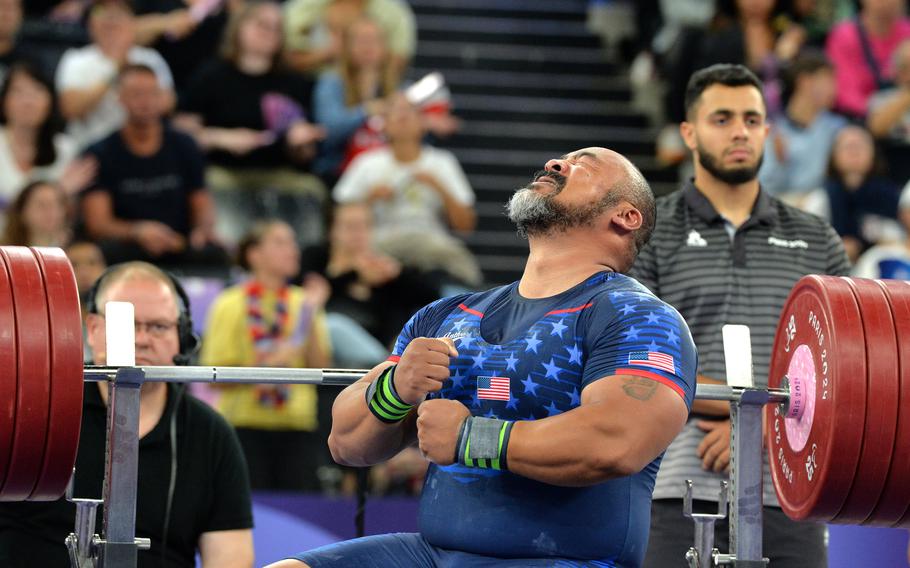
Bobby Body reacts after failing to lift 232 kilograms, or 511.5 pounds, at the para powerlifting competition at the 2024 Paris Paralympics., Sept. 8, 2024. The Army veteran finished fourth in the up to 107 kilogram class. (Michael Abrams/Stars and Stripes)
PARIS – Bobby Body exemplifies better than most the struggles to grow the sport of para powerlifting in the United States, as well as its untapped potential.
The Army veteran who also enlisted in the Marines, but was medically discharged after a knee injury, turned to powerlifting in 2014 after a therapist told him to work out his aggression.
The 50-year-old became almost obsessed with it to the point his wife, Erin, implored him to stop attending every single competition he could.
At first, Body was lifting against able-bodied competition, and he declined U.S. para powerlifting’s initial recruitment. It took some time, but three years after joining the program, the decision is paying off.
At Porte de La Chapelle Arena on Sunday morning, Body came agonizingly close to the podium in the men’s up to 107 kilogram (236 pound) competition at the 2024 Paris Paralympics, finishing in fourth place with a lift of 218 kilograms (480.6 pounds).
“We had a long cold streak of getting athletes on the team because nobody really knew about para powerlifting,” Body said. “Over the last year, we’ve tried to make an effort to reach out to people with disabilities all over the nation.
“A lot of people are taking notice and they’re like, ‘Oh, I want to give it a try.’”
The one group Body hopes to reach is veterans.
The Eaton Rapids, Mich., native enlisted in the Army after the Sept. 11, 2001, attacks. While deployed in Iraq, his Humvee was hit by a roadside bomb in February 2006. After 21 surgeries to repair his injuries, Body had his left leg amputated above his knee in 2013.
Body said he hopes his rise in the sport to finishing fourth at the Paralympics will inspire others. He plans on going to the Warriors Games, Military World Games and the National Veterans Wheelchair Games to drum up interest.
“I know those guys would be all for it just because they love the camaraderie of team, just like being in the military with your unit,” Body said. “I know that they’ll train hard and a lot of them will do very well.”
In terms of his personal competitive goals on Sunday, Body fell just short of getting a medal. Mexico’s Jose de Jesus Castillo Castillo claimed the bronze with a best lift of 222 kilograms (489.4 pounds) – 4 kilograms (8.8 pounds) better than Body.
Iran’s Aliakbar Gharibshahi and Mongolia’s Sodnompiljee Enkhbayar traded new Paralympic records back and forth before Gharibshahi took gold at 252 kilograms (555.5 pounds) and Enkhbayar the silver at 248 kilograms (546.7 pounds).
“You want to get on the podium, and I trained very hard to get on that podium,” Body said. “At the same time, I’m here. I can’t be more proud and be happy to be here.”
The problem for Body wasn’t that he lacked the power to lift 231 to 232 kilograms (509 or 511 pounds) – it was his technique. The bar must be level the entire time, and on his second attempt, one side came up just a smidge ahead of the other.
The review confirmed it despite the U.S. challenge.
On the third attempt, Body tried without a press command from his coach telling him to lift off his chest like how he practices at home. The judges determined he didn’t pause with the bar long enough, though, and the American picked up a second failed try in a row.
“I knew that strength-wise I could get it,” said Body, whose plan originally was to shoot for 237 kilograms and an Americas elite record had he completed the second lift successfully. “It is what it is, and I will get them next time.”
Even at 50 years old, Body has no doubt he’ll be competing during the Los Angeles Games in 2028.
He’s debating in which class he will compete. Body began the 2024 cycle at 97 kilograms before bulking up enough to join the 107 group as one of the lightest competitors.
He’s even looking ahead to Brisbane, Australia, in 2032 when he would be 58 years old.
“I told my team lead I’ll stop when I’m 60,” Body said.